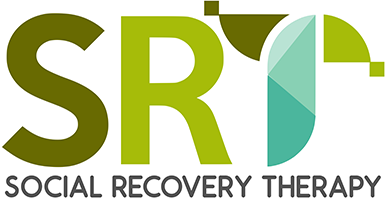SRT: Depression as a barrier to social recovery
SRT Depression & Social Recovery: Low mood is a typical feature of social disability, so it is essential to assess its presence and impact on social recovery. Low mood and lack of structured activity can mutually reinforce each other. Low mood can prevent individuals from wanting to engage in activity, to feel that they have the interest or energy, or to have any beliefs about possible positive outcomes or enjoyment. Yet lack of structured activity can maintain low mood by preventing individuals from experiencing a sense of achievement, mastery, closeness or pleasure. Lack of hope and positive beliefs about the self, world and future can further serve to reinforce avoidance and withdrawal from structured activity and social interactions. Nihilistic thoughts may undermine the individual’s sense of their own values and meaning in life.
Depression and SRT
Assessment may be complicated by emotional avoidance, nihilism and a sense of ‘numbness’. It should focus on current cognitive and behavioural avoidance cycles and other maintenance factors involved (e.g. rumination, sleep problems). After careful SRT formulation of the maintenance of the low mood, SRT therapists should consider the following:
1. Maximise behavioural work –
- Behavioural work is the preferred focus of intervention in order to boost a positive sense of self and agency.
- In the context of nihilistic thoughts, care needs to be taken around engagement in philosophical discussion as this can impair the therapeutic relationship and contribute to behavioural avoidance.
2. Ensure collaborative engagement –
- Encouraging the person to take part in activities in a non-collaborative way is likely to impair efforts to address low mood. Instead, behavioural activation should follow the person’s values and interests.
3. Collaboratively design behavioural experiments relating to negative beliefs about self and activity –
- Behavioural experiments to test out whether activity can impact on mood, and the person’s ability to tolerate new activities are usually helpful methods to start this process.
4. Prepare for challenges arising during behavioural experiments –
- If the person experiences aversive emotions during behavioural experiments, this must be tactfully managed to mitigate negative impact on the social recovery process.
- It is helpful to use the “self as hero” at these points, to emphasise how positive it is to pursue goals despite such challenging experiences.
5. Emphasise positive movement towards goals –
- A sense of optimism and hopefulness must be at the heart of SRT. Gentle encouragement, persistence and “walking alongside the client” are key.
- Reframing success as pursuing, rather than achieving, goals is encouraged.
- Emphasis on the positive aspects of each small step, particularly in the early stages when achievements may seem insignificant, helps engender increased hopefulness and scaffold continuing social recovery.
Additional Resources
Beck Institute READ MORE

